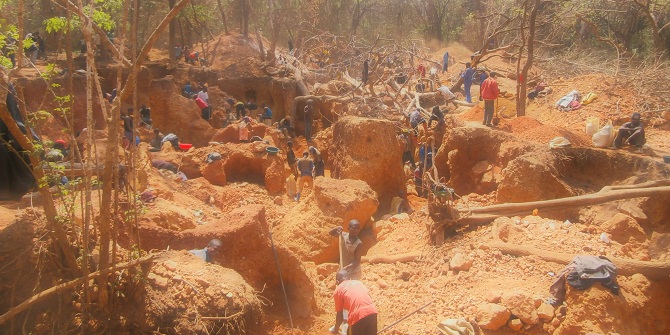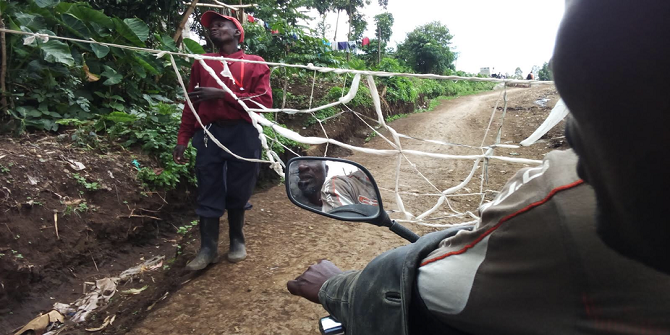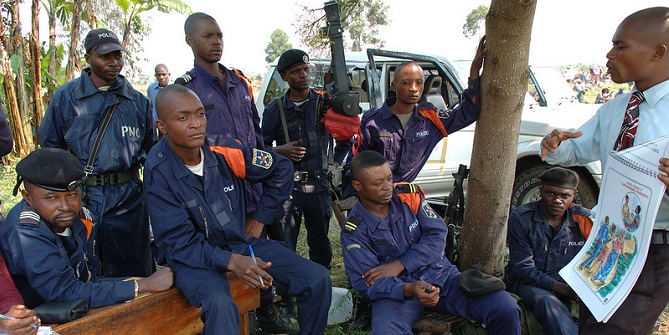Large-scale awareness of the link between artisanal mining and the continuation of the armed conflict in eastern Democratic Republic of Congo (DRC) began to develop at the end of the first decade of the 2000s (Nest 2011). Armed groups were said to control mine sites and their production in order to finance their military operations, fuelling the continuation of conflict. In order to break the supposed link between natural resources and conflict, a large variety of conflict mineral initiatives began to emerge around 2010 with the ambition of improving transparency in extracting and trading minerals’ flow (Cuvelier et al. 2014). Examples of these initiatives include the ITRI Tin Supply-chain initiative (iTSCi) which provides a means of determining the origin of 3T1 and documenting the trading chain for these minerals by ‘tagging and bagging’ their loads near miners’ shafts at counting offices (comptoirs) and in mineral depots, before the minerals are exported through the international market.
This blog explores an under-documented dimension of Congo’s mineral governance: the ‘Basket Fund’, in other words, the revenues gathered from mining operators, i.e. mining cooperatives, entités de traitement (processing entities), middlemen and mineral transporters. The Basket Fund aims to finance development projects for grass-roots mining communities. Based on qualitative data gathered in the South-Kivu province from June 2018 to May 2019, this blog argues that the Basket Fund has become a tool for ‘business reform’ in the mining landscape. Due to their political influence and through tortuous and predatory budgetary practices of embezzlement, the provincial state authorities involved in managing the Basket Fund are seen to derive various personal benefits, including political positioning, while stifling the development of the mining communities concerned.

The short-lived span of the Basket Fund
The creation of the Basket Fund started from the failure of the Congolese state to enforce fully fiscal autonomy of provinces. According to the 2002 mining law (Article 242), royalties paid by extractive companies to the national treasury are distributed as follows: 60% contribute to the functioning of the central government in Kinshasa, and respectively 25% and 15% are allocated to decentralised provinces and territories where extractive companies are established. In addition, according to article 175 of the 2006 constitution, the provinces are allowed to keep 40% of the national tax revenues right away (‘retenue à la source’).
However, all of these legal provisions have never been enforced, mainly due to a lack of political will by the national government. In 2012, provincial governments of Maniema, North and South-Kivu — where iTSCi is in force — set up the Comité Provincial de Suivi (CPS or provincial follow-up committee). Presided over by the provincial ministries of mines and composed of state government officials, civil society organisations and mining operators, the CPS is led by a coordinateur technique (or technical coordinator) who aims to monitor artisanal mining activities in each province. In response to the inability of the Congolese state to redistribute the revenues from the extractive sector to lower-level echelons, the provincial governments of the three provinces instituted the Basket Fund. The Basket Fund thus resulted from an ad hoc policy arrangement between provincial authorities, civil society organisations and these operators who also participated in its management. It was a voluntary contribution worth $180/tonne of 3T exported, whereby mining cooperatives contributed $30; middlemen contributed $50; processing entities contributed $75 and mineral transporters contributed $25.
Yet, following a provision (Articles 285 and 414) of the Congolese mining code (renewed in 2018) which stipulates that mining operators are required to pay 3 % from their annual turnover as a contribution to local development projects, on 1st February 2019, the National Minister of Mines, Martin Kabwelulu Labilo, banned the Basket Fund collection in the three provinces concerned.
Between 2013 and 2018, the total payments collected in the Basket Fund amounted to nearly $1,692,000. Of this amount, $362,000 (21.3%) was allocated to finance development projects (e.g. schools, health centres, bridges, community halls etc.) in targeted localities where mining activities took place. To some extent, such investments which never existed before may challenge the widespread conviction that ‘mining has so often delivered adverse social, environmental and economic effects for the many, but significant gains only for the few’ (Bebbington et al. 2008). And yet, even though the constructed/renovated infrastructures have been useful for the communities concerned, one may wonder: what happened to the remaining $1,330,000?
Predation, power games and politisation
The following section discusses three main findings of this study.
1. Unforeseen predatory practices
The creation of the Basket Fund resulted from a mutual agreement between the entities involved. Yet, I argue that its everyday management resulted in unforeseen practices. As one respondent in Bukavu asserts: “Provincial state authorities of South-Kivu are very powerful. They are able to design, legalise and change the agreement on the Basket Fund management without the consent of the other entities involved.” (Interview with civil society members, 20 February 2019).
Some events provide evidence to this claim. In September 2014, the Governor of South-Kivu, Marcellin Cishambo Ruhoya, probably in search for popularity, tried to use the amount collected in the Basket Fund to finance the construction of a football stadium at Nyantende, near his native village. His attempt did not succeed due to the opposition of representatives from the civil society. In March 2018, Apollinaire Bulindi, the provincial minister of mines unsuccessfully plotted to empty the Basket Fund coffer, before he was ousted from the provincial government of South-Kivu. In July 2018, the CPS Coordinateur technique, Bundia Bulia Eloi, claimed $58,000 for the payment of a new Jeep Land-Cruiser for the purpose of supervising mining sites. From this payment, the leakage of approximately $18,000 could hardly be unnoticed because the same vehicle is worth only $40,000. These examples suggest that state authorities were not eager to promote development projects in mining communities. Rather, the Basket Fund was seen as an opportunity for personal enrichment.
2. State encroachment on the Basket Fund
The Basket Fund was a solution to state failure in resource-revenue redistribution. Ironically, provincial state authorities (e.g. the provincial minister of mines) presided over the CPS and participated in the Basket Fund management. This ‘revival’ of the state through the Basket Fund has provided room of manoeuvre for these authorities to use their power in controlling the functioning of the CPS and the Basket Fund collected. For instance, no meeting gathering CPS members could be held without the presence of the provincial minister of mines. In September 2018, the head of the Governor Cabinet, Nicaise Cikuru Munyiogwara, signed a decree (No. 18/036/GP/SK) which promoted Bundia Bulia Eloi as the coordinator (not coordinateur technique) of the CPS and, at the same time, a counsellor of the Governor of South-Kivu, Claude Nyamugabo Bazibuye, in charge of mining governance. As the governor’s head of cabinet is not entitled to issue such a decree, mining operators and civil society representatives suspected this strategic promotion as a way of facilitating money leakage from the Basket Fund. Thus, conflict broke out between them and state authorities. Mining operators and civil society representatives suspended their participation in the CPS meetings.
The large reach of state authorities is also illustrated through the ban of the Basket Fund by the National Ministry of Mines. One respondent observed that: “If the Basket Fund was instituted after consultation by all the entities involved, its ban should also result from another consultation” (Interview with mining cooperative members, Bukavu, 6.3.2019). I argue that the opaque role of state authorities in steering the CPS, in managing and banning the Basket Fund distorts the impact of this financial bailout for the development of mining communities.
3. Politisation
Contrasting with the idea of promoting local development, state authorities often used the Basket Fund projects to convey political messages. In a context where the state is dysfunctional and unable to perform its basic functions (Trefon 2004), such messages can be read as a strategy of state legitimation. Beyond the fact that the reforms of the extractive sector have become a business in economic terms, this business is also political. For example, on 23 June 2017, at the unveiling of the polyvalent hall built at Nyamukubi (Kalehe), Claude Nyamugabo Bazibuhe stated that the hall was an achievement of his provincial government. He thus invited the local population to support this government, as well as his political mentors in Kinshasa. The same speech was recited at Shabunda-centre on 10 August 2018 during the opening ceremony of rehabilitation of the Pont Yuyu. In short, provincial state authorities were using the inauguration of projects financed by the Basket Fund as an opportunity to show up and to gather popular support. I argue that, although these projects gained the support from state authorities, their selection and implementation resulted from joint efforts by both the mining operators and civil society representatives, more than by these authorities as such.
Conclusions and policy recommendations
Beyond what may be wilful attempts at promoting development projects in mining communities, there is no doubt that the management of the Basket Fund has become a source of personal enrichment and political positioning by state elites. Geenen and Cuvelier (2018) come to similar evidence, arguing that the Congolese elites are able to reposition themselves and to adapt to changes in the political economy of the extractive sector. This argument is consistent with Pierre Englebert’s remark that: ‘When considering what could plausibly be done to launch the country on a path of shared growth and development, one must keep in mind the central role of the state in the problem’ (Englebert 2014: 13).
As noted above, the renewed Congolese mining code makes it clear that mining operators are required to pay 3% as a contribution to local development projects (Dotation pour la contribution aux projets de développement communautaire). This is to be levied from their annual turnover. It is also foreseen to set up a specialised cell with the mandate of collecting and managing the amount collected. As this blog as shown, there is a serious risk that such an amount is embezzled and does not reach the state coffer. This study’s conclusions and policy recommendations can be summarised as follows:
1. Reduce the role of the state
State officials have strategised to use large chunks of the Basket Fund for their personal interests. This may also be the case for the Dotation pour la contribution aux projets de développement communautaire. I argue that, although the mining code has envisioned that this dotation can be more inclusive than the Basket Fund which was collected in only three provinces, an equal redistribution of mining revenues can benefit to local communities if the role of state is reduced, i.e. in presiding over this specialised cell. This suggests giving more decisional power to civil society organisations who have been battling to create more transparency in the mining sector.
2. Formalise public–private cooperation
The case of the CPS/Basket Fund shows that next to the state, the private sector (mining operators) and civil society organisations have also extended their involvement in mining governance. By and large, the cooperation between participants in this tripartite have yielded some positive changes following the implementation of projects targeting some mining communities. However, this tripartite and their clauses of cooperation seem to be informal, in other words based on ad hoc arrangements, rather than a formalised process. One lesson to be drawn from the CPS/Basket Fund’s experience is that there is a need to set-up solid railings in order to make this policy efficient.
3. Support local governance
The collection and management of the Basket Fund has certainly left its mark on the development of mining communities (through specific projects) and redefined the role of mining operators therein. This research demonstrates that the implementation of such projects does not necessarily mean that governance practices have improved or that the local populations are fully represented in their choice and set up. Excluding the local populations has resulted in the (dys)functioning of CPS, a network-like structure economically benefitting provincial elites. In the years to come, policymakers should support initiatives that try to involve local beneficiaries of the Dotation pour la contribution aux projets de développement communautaire in the management of such a dotation. In short, the impetus for socio-economic change in line with resources redistribution must stem from the ground-up who stand to gain from such a redistribution.
1 The abbreviation « 3T » refers to three types of minerals extracted in eastern DRC: tin (cassiterite), tantalum (coltan) and tungsten (wolframite). Coltan is an abbreviation of two mineral ores (columbite–tantalite) commonly used in eastern Democratic Republic of Congo.
References
Bebbington A., Hinojosa L., Bebbington D.H., Burneo M.L. and Warnaars X. (2008). ‘Contentious and ambiguous: mining and the possibilities of development’. Development and Change. 39(6):887–914.
Cuvelier, J., van Bockstael, S., Vlassenroot, K. and Iguma, C. (2014). Analyzing the impact of the Dodd-Frank Act on Congolese livelihoods. Social Science Research Council Conflict Prevention and Peace Forum, New York, November.
Englebert P. (2014). Democratic Republic of Congo: Growth for All? Johannesburg: Brenthurst Working Paper 6/2014.
Geenen S. and Cuvelier J. (2018). ‘Local elites’ extraversion and repositioning: Continuities and changes in Congo’s mineral production networks. The extractive industry and society, http://doi.org/10.1016/j.exis.2018.10.013
Nest M. (2011). Coltan. Cambridge: Polity Press
Trefon T. (2004). Reinventing Order in the Congo: How People Respond to State Failure in Kinshasa. London: Zed Books
Note: The CRP blogs gives the views of the author, not the position of the Conflict Research Programme, the London School of Economics and Political Science, or the UK Government.





